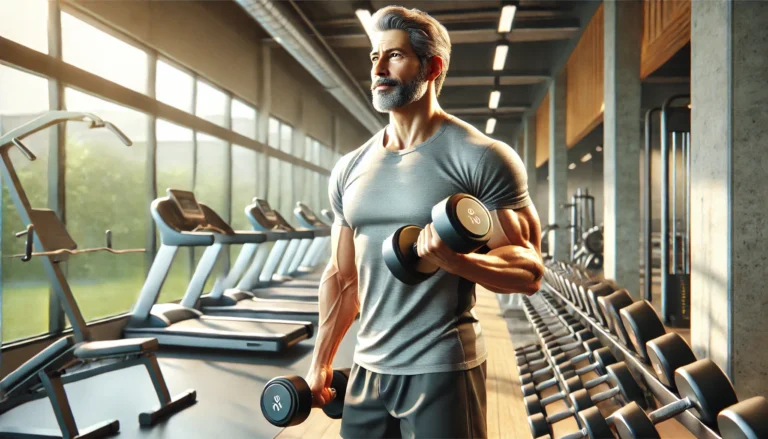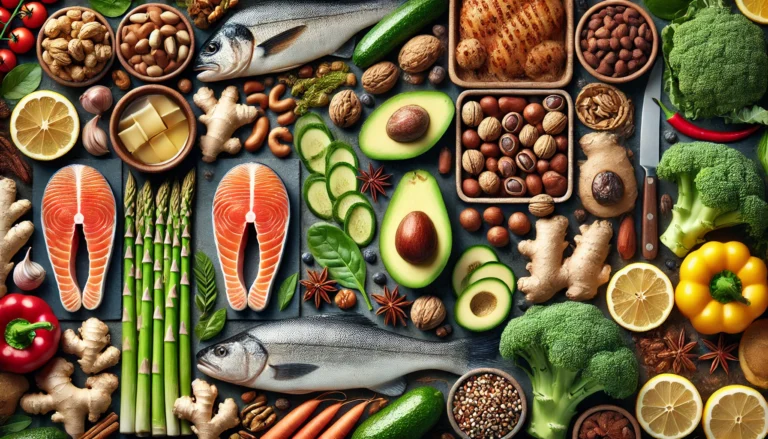Did you know that a whopping 73% of men over 40 struggle with weight management? If you’re reading this, chances are you’re part of that statistic – and let me tell you, you’re not alone in this journey. I’ve been there, done that, and boy, do I have some stories to share!
As we cruise past 40, our bodies start pulling some sneaky moves on us. Suddenly, that pizza doesn’t slide off as easily as it used to, and those stairs… when did they get so darn long? But here’s the kicker – it’s not just about looking good in those old jeans (though that’s a nice perk). It’s about feeling great, staying healthy, and having the energy to keep up with life’s curveballs.
In this guide, we’re going to dive deep into the world of nutrition and weight management for us distinguished gentlemen over 40. I’ll share some hard-earned wisdom, sprinkle in some science, and hopefully, we’ll have a few laughs along the way. So grab a (healthy) snack, settle in, and let’s get started on reclaiming our health in 2024!
Understanding the Unique Nutritional Needs of Men Over 40
Alright, let’s talk about the elephant in the room – hormones. Yeah, I said it. We men don’t like to admit it, but after 40, our hormones start doing the cha-cha. Testosterone levels start to dip, and suddenly, our metabolism decides it needs a permanent vacation.
I remember when I first noticed these changes. I was out playing basketball with my son, and after just 15 minutes, I was huffing and puffing like I’d run a marathon. That’s when it hit me – my body wasn’t bouncing back like it used to.
But here’s the deal – we’re not doomed to a life of dad bods and afternoon naps. We just need to understand what our bodies need now. For starters, we need to pay extra attention to certain nutrients:
- Protein becomes our best friend. It helps maintain muscle mass, which naturally declines as we age.
- Calcium and Vitamin D are crucial for keeping our bones strong. (Trust me, you don’t want to end up like my buddy Mike who broke his hip trying to show off at his daughter’s dance recital.)
- Fiber is more important than ever for heart health and digestion. (Let’s just say it keeps things… moving.)
- Omega-3 fatty acids are like brain food. They help keep our minds sharp and our hearts healthy.
The Role of Calories and Macronutrients in Weight Management
Now, let’s talk about the big C – Calories. As much as we might wish otherwise, they still matter. But here’s the tricky part – our calorie needs actually decrease as we age. I learned this the hard way when I kept eating like I was still 25 and training for a marathon.
So, how many calories do you need? Well, it depends on your activity level, but for most of us over 40, it’s somewhere between 2,200 to 2,800 calories a day. But don’t just take my word for it – use an online calculator or talk to a nutritionist to get your personalized number.
Now, let’s break down those calories into macronutrients:
- Protein: Aim for about 1.2 to 1.6 grams per kilogram of body weight. For a 180-pound guy, that’s roughly 100-130 grams a day.
- Carbs: Don’t ditch ’em completely! Just choose wisely. Whole grains, fruits, and veggies are your go-to’s.
- Fats: Yes, you need them! Focus on healthy fats like those in avocados, nuts, and olive oil.
I used to think all carbs were the enemy. Then I tried cutting them out completely. Let’s just say my wife wasn’t too thrilled with my “hangry” mood swings. Balance is key, gentlemen!
Superfoods and Nutrient-Dense Meals for Optimal Health
Alright, time for some food talk! Let’s start with superfoods – those nutritional powerhouses that pack a serious punch. Here are my top picks:
- Blueberries: Packed with antioxidants, these little blue gems are great for brain health.
- Salmon: Hello, omega-3s! Plus, it’s a lean protein source.
- Spinach: Popeye was onto something. This leafy green is loaded with nutrients.
- Greek yogurt: High in protein and good for gut health.
- Nuts: A handful a day keeps the doctor away (or something like that).
Now, I know what you’re thinking – “But I don’t have time to prepare fancy meals!” Trust me, I get it. That’s why I’m all about quick, nutrient-packed recipes. Here’s one of my go-to’s:
The “No-Excuses” Power Bowl:
- 1 cup cooked quinoa
- 4 oz grilled chicken
- 1/2 avocado, sliced
- Handful of spinach
- Sprinkle of almonds
- Drizzle of olive oil and lemon juice
Mix it all together, and boom! You’ve got a meal that’s packed with protein, healthy fats, and plenty of vitamins and minerals.
Remember, portion control is key. I used to pile my plate high, thinking I needed huge portions to feel satisfied. Now, I use the “hand method” – a palm-sized portion of protein, a fist-sized portion of veggies, and a cupped handful of complex carbs.
Effective Exercise Strategies for Weight Management in Middle Age
Alright, let’s talk about the E-word – Exercise. Now, before you groan and reach for the remote, hear me out. Exercise doesn’t have to mean hours at the gym or running until you collapse.
When I hit 45, my knees started to protest against my daily runs. I thought my exercising days were over until a buddy introduced me to the wonderful world of low-impact workouts. Here’s what I’ve learned:
- Combine cardio and strength training: This dynamic duo helps burn fat and build muscle. Try 30 minutes of brisk walking followed by some bodyweight exercises like push-ups and squats.
- Swimming is a gem: It’s easy on the joints and gives you a full-body workout. Plus, you get to cool off! Win-win.
- Yoga isn’t just for the ladies: I was skeptical at first, but yoga has done wonders for my flexibility and stress levels. Don’t knock it till you’ve tried it, guys!
- Resistance bands are your friends: These stretchy wonders provide a great strength workout without the need for heavy weights.
The key is consistency. Find something you enjoy and stick with it. I now have a routine of swimming twice a week, yoga on Sundays, and resistance band workouts in between. And you know what? I feel better now than I did in my 30s!
Lifestyle Factors That Influence Weight and Nutrition
Now, let’s talk about the elephant in the room – stress. We’ve all got it, and let me tell you, it’s not doing our waistlines any favors. When I was going through a tough time at work, I found myself reaching for the cookie jar more often than I’d like to admit.
Here’s the deal: stress triggers the release of cortisol, which can increase appetite and lead to weight gain, especially around the midsection. So, how do we combat this? Here are a few strategies that have worked for me:
- Meditation: I know, I know, it sounds a bit woo-woo. But just 10 minutes a day of quiet reflection can work wonders. There are some great apps out there to get you started.
- Regular exercise: Remember those workouts we talked about earlier? They’re great stress-busters too!
- Hobbies: Find something you enjoy that’s not work-related. For me, it’s gardening. There’s something therapeutic about getting my hands dirty and watching things grow.
Another big factor? Sleep. I used to wear my 5-hours-a-night schedule like a badge of honor. Big mistake. Lack of sleep messes with your hunger hormones, making you more likely to overeat. Aim for 7-9 hours a night. Your body (and your family) will thank you.
And let’s not forget about social life. It’s important to stay connected, but those weekend barbecues and after-work drinks can sabotage your health goals if you’re not careful. My solution? I became the guy who brings the veggie platter to parties. Sure, I got some eye-rolls at first, but now my buddies actually look forward to my guilt-free snacks!
Overcoming Common Obstacles in Weight Management for Older Men
Let’s face it, fellas – losing weight after 40 isn’t a walk in the park. Our metabolism slows down, making it easier to pack on the pounds and harder to shed them. But don’t throw in the towel just yet!
I remember hitting a plateau about six months into my weight loss journey. The scale wouldn’t budge, and I was ready to give up. But instead of quitting, I decided to switch things up. I tried new recipes, changed my workout routine, and even started a friendly weight loss competition with my coworkers.
Here are some strategies that helped me overcome common obstacles:
- Dealing with a slower metabolism: Focus on building muscle through strength training. More muscle means a higher resting metabolic rate.
- Managing cravings: I started keeping a food diary and noticed patterns in my cravings. Turns out, I always wanted something sweet around 3 PM. So, I started packing a piece of fruit for my afternoon snack.
- Staying motivated: Set non-scale victories. Maybe it’s being able to play with your kids without getting winded, or fitting into that old college t-shirt. Celebrate these wins!
- Adapting to physical limitations: Work with, not against your body. If running hurts your knees, try cycling or swimming instead.
Remember, it’s not about being perfect. It’s about making progress, no matter how small.
Supplementation and Vitamins: What Men Over 40 Really Need
Alright, let’s talk about supplements. Walk into any health food store and you’ll be bombarded with promises of miracle pills and powders. But do we really need all that stuff?
Here’s my take: a balanced diet should be your primary source of nutrients. But as we age, our bodies might need a little extra help in certain areas. Here are some supplements worth considering:
- Vitamin D: Especially important if you don’t get much sun exposure.
- Omega-3s: Great for heart and brain health.
- Calcium: For strong bones (remember my buddy Mike?).
- Vitamin B12: Many older adults have trouble absorbing this from food.
Now, about those testosterone boosters and weight loss pills… Proceed with caution, gents. Many of these aren’t regulated and can have nasty side effects. Always, and I mean always, consult with your doctor before starting any new supplement regimen.
As for protein powders, they can be a convenient way to boost your protein intake, especially if you’re doing strength training. Just don’t go overboard – your body can only use so much protein at once.
Creating a Sustainable Long-Term Plan for Health and Fitness
We’re in the home stretch now, guys! Let’s talk about turning all this information into a sustainable plan.
First things first – set realistic goals. When I started my health journey, I wanted to lose 30 pounds in two months. Spoiler alert: it didn’t happen. I got discouraged and almost gave up. Don’t make my mistake. Aim for steady, sustainable progress.
Track your progress, but don’t obsess over the scale. Take measurements, progress photos, and note how your clothes fit. Sometimes the scale doesn’t budge, but you’re still making progress in other ways.
Build a support system. This was a game-changer for me. I joined a men’s fitness group at my local community center. Having like-minded guys to share the journey with made all the difference.
Remember, this is a lifelong journey. As you age, your needs will change. Be prepared to adapt your plan. Maybe you can’t lift as heavy as you used to, or you need to cut back on high-impact exercises. That’s okay! The goal is to stay healthy and active, not to be a bodybuilder (unless that’s your thing, in which case, more power to you!).
And please, don’t skip those regular check-ups with your doctor. They can catch potential issues early and help you adjust your health plan as needed.
In conclusion, fellas, managing our nutrition and weight after 40 isn’t always easy, but it’s definitely worth it. We’ve got a lot of life left to live, and taking care of our health now means we’ll be around to enjoy it for years to come.
Remember, it’s never too late to start. Whether you’re 41 or 81, the best time to begin is now. So, what are you waiting for? Take that first step today. Your future self will thank you.
And hey, I’d love to hear about your own experiences. What strategies have worked for you? What challenges have you faced? Drop a comment below and let’s keep this conversation going. After all, we’re all in this together!
Now, if you’ll excuse me, I’ve got a date with a barbell and a protein shake. Here’s to our health, gentlemen!







